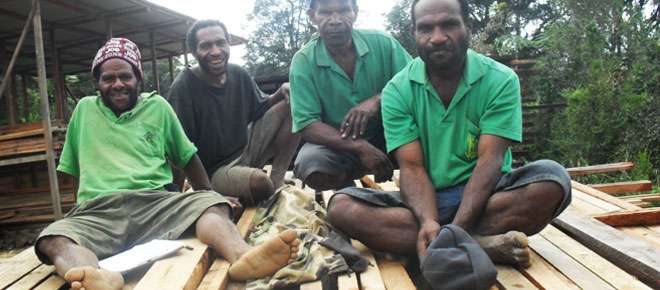In Papua New Guinea more than 40 per cent of people live on less than just $3 a day. Income in the remote Highlands is often even lower.

In Papua New Guinea more than 40 per cent of people live on less than just $3 a day. Income in the remote Highlands is often even lower.
Isolation, rugged terrain and difficult access prevent the development of commercial agriculture. The only paved road in and out of the region is frequently targeted by bandits.
Employment prospects are extremely limited and people here survive on the vegetables they manage to grow themselves, mainly root crops like cassava and taro.
To make matters worse, the polluted Wahgi River is the main water supply for drinking, cooking and washing and power supply. It frequently leaves people ill.
Decades of tribal conflict has hewn communities apart. Gender violence, rising HIV rates, accusations of sorcery, gangs of armed rascals and the proliferation of small arms and drugs have left communities volatile, vulnerable and caught in a poverty trap that is hard to escape from.
The response
There’s one group of tribes facing these problems head on, together.
KGWan is a village-based collective comprised of three clans: the Kunaiku, Gereglkane and Wandike. They operate in the heavily forested area of Mitnade, Chimbu province.
KGWan’s main activity is sustainably harvesting the forest for the sought after timber that’s used in building homes and community buildings in the area. The clan, and their full time forester, use a walkabout chainsaw to chop down mature trees, replacing them with native seedlings. The wood is sawn to size then carried through the dense forest along small tracks to a small sawmill, where it is processed into usable pieces. This wood is sold to members of the collective and the money is reinvested back into the business. One way the money has been used is opening up access to the forest by hand building a road. This will make it significantly easier to bring the milled timber to the station from where it’s sold.
Environmental assurances
Sustainability is at the heart of KGWan’s ethos. Members understand that sound management of the forests is needed if communities are to benefit from them. They’ve developed a robust land use plan that combines conservation with economic benefits. And for every tree they log, they replant five. They are also replanting grasslands with 2,000 gum and pine trees every year, with 6,000 trees planted so far.
Their land use plan and forestry techniques are recognised by the PNG government and KGWan take part in a national forestry research project conducted by the University of Melbourne. This monitors their forestry project every two years.
Forest cosy
Families traditionally live in huts made from bush materials. The homes are vulnerable to bad weather, especially rains. In this remote part of Papua New Guinea, it’s rare for local people to live in Western style houses. KGWan is changing that.
Money from the sustainably logged timber sales is used in the construction of their own ‘forest cosy’ houses.
KGWan has built 20 permanent, three bedroom houses, with a target of building 104 homes by 2014. The new houses are being future-proofed so that as piped water and electricity come online from Oxfam’s WASH work and mini-hydro dams, they are ready for connection. This is the first time that most people of KGWan have ever had a stable, solid place to call home.
Building homes, building communities
They have also constructed a permanent double-storey office complex, a guest house accommodation unit and a double classroom elementary school, which accommodates their 300+ children (aged 5-7) who prior to the school’s construction had to walk 5km to the nearest school.
Gender justice
The forest cosy homes are owned by KGWan’s women.
The tribes developed a local by-law that specified men would own the land, but women legally own the properties on it. This addresses the need to balance out inequitable gender relations around land and house ownership, enhancing women’s status, confidence and security. KGWan has also developed a small loan scheme for women to acquire household goods and ensured them representation on the collective’s governing Executive Committee.
This eco-forestry programme is not just about utilising and sustaining precious forest resources. It’s teaching people life long skills that take them away from traditional subsistence living and into money-earning jobs.



